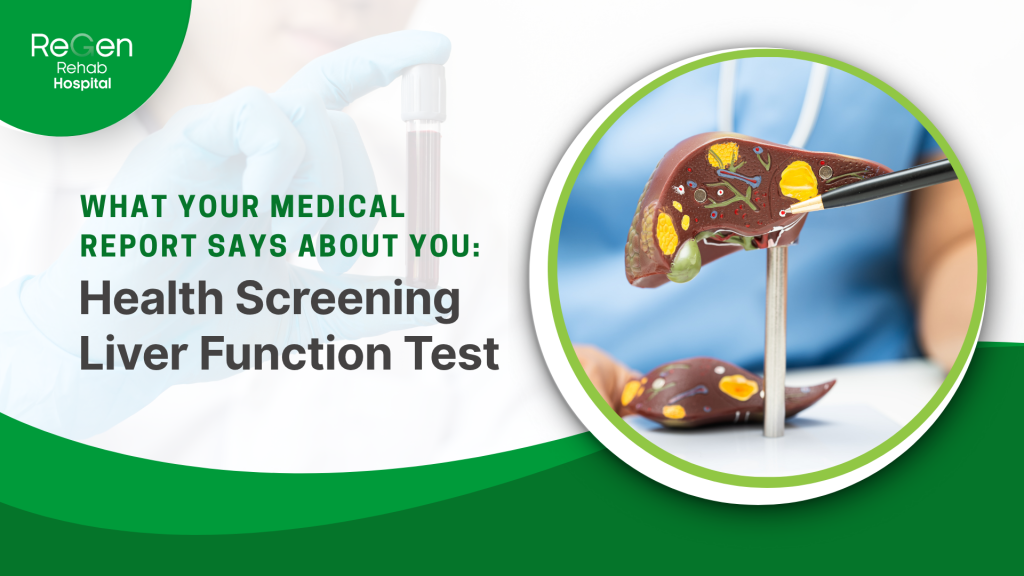Your liver is one of the body’s hardest working organs. It processes nutrients, removes toxins, regulates hormones, and keeps your metabolism running smoothly. The problem is that liver conditions often develop silently without obvious warning signs until they reach advanced stages.
That is why a health screening liver function test (LFT) is so valuable. This simple blood test helps evaluate how well your liver is working, detect early damage, and guide timely treatment.
What is Liver Function Test?
A liver function test measures enzymes, proteins, and waste products in your blood to show how well your liver is performing. Together, these results give an overview of your liver’s health.
The main markers include:
- Bilirubin: A waste product from red blood cells. High levels may indicate liver disease or bile duct problems.
- Proteins (Total Protein, Albumin, Globulin): Show the liver’s ability to produce essential proteins that maintain fluid balance and fight infections.
- A/G Ratio: The ratio of albumin to globulin. An imbalance can suggest liver or immune system issues.
- Alkaline Phosphatase (ALP): An enzyme related to bile ducts. Elevated levels may point to liver or bone disorders.
- AST (SGOT) and ALT (SGPT): Enzymes that rise when liver cells are damaged. They are key markers for hepatitis and fatty liver disease.
- Gamma-Glutamyl Transferase (GGT): Sensitive to alcohol-related liver injury and bile duct problems.
- Fibrosis-4 (FIB-4) Score: A calculation that uses age, liver enzymes, and platelet count to estimate the risk of liver scarring (fibrosis).
Why Liver Function Tests Matter
The liver has an incredible ability to repair itself, but only if problems are detected in time. A health screening liver function test helps to:
1. Identify hidden damage
Conditions like fatty liver disease, hepatitis, or alcohol-related injury often show no symptoms until late stages.
2. Monitor Chronic Conditions
Diabetes, obesity, and high cholesterol all increase the risk of liver disease.
3. Track the effects of medication
Some medications can affect the liver. Regular tests allow doctors to adjust treatments when needed.
4. Prevent serious complications
Early management can stop progression to cirrhosis, liver failure, or even cancer.
Understanding Your Liver Function Test Results
Your liver function report lists each parameter with measured values and reference ranges. Values outside the normal range do not always indicate serious disease, as hydration, diet, medications, and recent illness can influence results. Here’s a general reference for common parameters:
Liver Function Test (RFT) Reference Table
| Parameter | Common Adult Male Range | Common Adult Female Range | Unit | What It Measures |
|---|---|---|---|---|
| Bilirubin (Total) | 5 - 21 | umol/L | Measures the breakdown product of red blood cells; high levels may indicate jaundice, liver disease, or bile duct problems | |
| Protein (Total) | 66 - 83 | g/L | Reflects the liver’s ability to produce proteins; low levels may indicate poor liver function or malnutrition | |
| Albumin | 32 – 52 | g/L | Shows protein made by the liver; low levels may point to chronic liver disease or poor nutrition | |
| Globulin | 21 – 40 | g/L | Represents proteins that support immunity; high levels may be linked to chronic inflammation or immune activity | |
| A/G Ratio | 1.0 - 2.2 | index | Compares albumin to globulin levels; imbalances may suggest liver, kidney, or immune disorders | |
| Alkaline Phosphatase (ALP) | 43 – 115 | 33 – 98 | U/L | Enzyme linked to bile ducts and bones; high levels may signal bile duct blockage or bone disease |
| AST (SGOT) | < 50 | < 35 | U/L | Enzyme released when liver or muscle cells are damaged; higher levels may indicate liver cell injury |
| ALT (SGPT) | < 50 | < 35 | U/L | Enzyme more specific to liver damage; elevated values are a sensitive marker of liver injury |
| GGT | < 55 | < 38 | U/L | Enzyme sensitive to alcohol intake and bile duct problems; high levels may suggest liver or bile duct issues |
| Fibrosis-4 | < 1.3 low risk; > 2.67 high risk | - | Uses age, liver enzymes, and platelet count to estimate the risk of liver scarring (fibrosis) | |
Note: These are general reference ranges. Actual normal ranges can vary between laboratories. Always consult your specific lab report with our doctor for accurate interpretation.
It is important to remember that abnormal results do not always indicate a serious medical condition. Many factors, such as hydration levels, medications, or recent illness, can temporarily influence your renal function test outcomes. Our doctor will consider your overall health, medical history, and other relevant tests to provide an accurate diagnosis and guide the next steps in your care.
Common Symptoms of Liver Problems
In many cases, liver disease develops quietly without symptoms. However, some signs that may point to liver problems include:
- Persistent fatigue or weakness
- Yellowing of the skin and eyes (jaundice)
- Swelling in the legs, ankles, or abdomen
- Dark urine or unusually pale stools
- Nausea, vomiting, or poor appetite
- Unexplained weight loss
If you notice any of these symptoms, it is important to consult a healthcare professional promptly.
Who Should Get Tested Regularly?
Certain conditions and habits increase your risk of liver disease. You may need more frequent liver function tests if you have:
- Diabetes, obesity, or high cholesterol
- Consume alcohol often
- Have a family history of liver disease
- Take long-term medications such as statins, TB drugs, or painkillers
- Have a history of hepatitis or other viral infections
Taking Care of Your Liver
Your liver is resilient, but it cannot protect itself without your help. A health screening liver function test gives you clear insights into your liver’s health, allowing you to make better lifestyle choices and seek treatment early if needed.
Protect your liver today. Schedule a health screening and take a proactive step toward long-term well-being.

